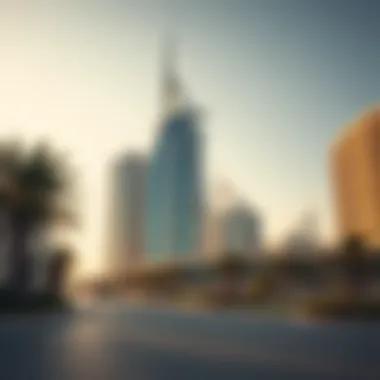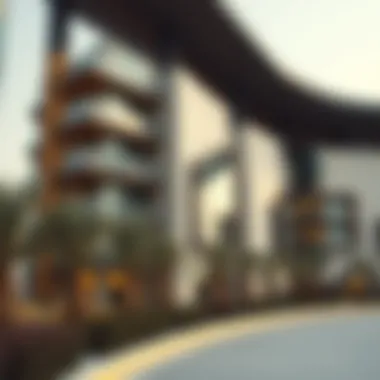Discovering Dubai's Real Estate Landscape and Trends


Property Trends in Dubai
The Dubai real estate market has become a hotbed for investment and innovation, constantly morphing to capture the interests of domestic and international buyers alike. The unique characteristics of this market are molded by a combination of luxury, cultural influences, and strategic governmental initiatives aimed at attracting foreign capital.
Emerging Neighborhoods and Hotspots
Note-worthy neighborhoods have emerged, making waves in the real estate scene. Areas such as Dubai Marina and Downtown are well-known, but beyond these established locales, new neighborhoods are catching the eyes of investors.
- Dubai Hills Estate is increasingly sought-after for its blend of upscale living and access to green spaces. With schools, retail areas, and recreational facilities, it's hard to ignore the allure of this community.
- Jumeirah Village Circle, or JVC, presents a more affordable option without sacrificing quality. Investors are drawn to its family-friendly vibe and growing infrastructure.
- In recent years, Meydan has also seen a surge in interest, particularly due to the developments surrounding horse racing and entertainment. Its unique blend of lifestyle and luxury is attractive to both buyers and renters.
Understanding these emerging hotspots is critical for anyone looking to make smart investment choices in Dubai.
Market Analysis and Future Predictions
The Dubai real estate market is not without its fluctuations. In 2023, the market has shown promising signs of stabilization following years of rapid price increases. According to reports from the Dubai Land Department, property values rose nearly 10% compared to the previous year.
As we look ahead, several factors could influence market dynamics:
- Continued economic diversification: As Dubai continues to move away from reliance on oil, its burgeoning sectors like tourism, technology, and renewable energy will only strengthen the demand for residential and commercial properties.
- Regulatory framework improvements: The government is committed to enhancing the real estate regulatory framework, which provides an element of security for investors and boosts confidence in the market.
- Expo 2020 legacy: The conclusion of Expo 2020 has left a lasting impact, with infrastructure projects and developments that promise added value to properties in surrounding areas.
"In 2024, experts forecast a continued growth trajectory for key sectors in the real estate market."
Investment Opportunities
Investing in Dubai's real estate offers significant potential, yet navigating this landscape requires astute awareness of viable opportunities.
High-ROI Property Types
When considering properties, some categories consistently yield higher returns:
- Luxury condos in prime locations: High-net-worth individuals show a preference for luxury properties, particularly those with sea views or near iconic attractions.
- Affordable rental apartments: Catering to a growing expatriate community, more affordable options in up-and-coming areas can offer high rental yields.
- Commercial properties: With businesses flocking to Dubai, investing in retail or office space can provide substantial returns, especially in well-trafficked locales.
Financing and Mortgage Options
Navigating financing options in Dubai’s real estate market can at times be intricate. Here’s a digest of available avenues:
- Home loans for expatriates: Many banks offer mortgage products tailored for non-residents, typically allowing for a maximum loan-to-value ratio of 75% on completed properties.
- Development loans for investors: These loans cater to those looking to invest in property development projects, often offering competitive interest rates and flexible terms.
- Islamic financing options: For investors seeking Sharia-compliant financing, several institutions provide options that align with Islamic banking principles.
For more insights, check resources like Wikipedia and Britannica.
The Essence of Unique Real Estate
Understanding the real estate landscape of Dubai commences with grasping what makes it unique. This city’s property market stands out, not just because of its soaring skyscrapers or extravagant villas, but due to a cocktail of cultural influences, economic strategies, and regulatory frameworks that create a distinctive environment for investment and development.
Unique real estate in Dubai transcends the mere bricks and mortar; it signifies an evolving narrative driven by market dynamics, investor sentiment, and societal values. The properties in Dubai reflect both a lavish lifestyle and a practical investment approach. Potential investors and industry stakeholders must comprehend these nuances to navigate the market successfully.
Real estate here offers an array of opportunities and challenges, often reflecting global trends while embedding local values. Thus, comprehension of this eclectic mix is essential for anyone looking to engage in property transactions, whether it’s for personal or commercial purposes.
Defining Unique Real Estate
Unique real estate can be defined by several characteristics including location, architectural style, and market demand. In Dubai, the landscape presents properties that marry innovation with tradition. Properties such as the Burj Khalifa offer not just living spaces, but blueprints of engineering marvels that personify ambition and luxury. Meanwhile, traditional souks and neighborhoods, like Al Fahidi, hold historical significance, showcasing how culture can shape property value and desirability.
The diversification of property types—from high-rise apartments in Dubai Marina to boutique villas on Palm Jumeirah—further illustrates what makes Dubai’s real estate unique. These varied categories cater to a broad spectrum of buyers and investors, enhancing the attractiveness of the market.
Furthermore, unique legal frameworks governing property in Dubai create distinctive ownership structures. Freehold areas allow foreigner ownership, enticing a global clientele, while the introduction of regulations surrounding off-plan sales has contributed to a more secure investment climate.
Cultural Influences on Dubai Real Estate
Cultural influences in Dubai play a crucial role in shaping the real estate market. The city is a melting pot of cultures, with expats from around the world contributing to a rich tapestry of societal values and lifestyles. This multicultural aspect extends into property preferences, creating an interesting dynamic in demand.
For instance, amenities catering to family needs like schools, parks, and community centers have gained popularity due to the diverse population. Adding to this is the luxurious lifestyle inherent in many high-end properties, drawing wealthy investors seeking both residence and a taste of opulence.
Moreover, festivals and cultural events influence property desirability in specific locales. Properties adjacent to landmarks, like the Dubai Mall or the Dubai Opera, tend to hold higher value due to their proximity to cultural hubs that attract both locals and tourists.
Distinct Property Types in Dubai
In the ever-evolving landscape of Dubai’s real estate market, understanding the distinct property types is paramount. Each category boasts unique characteristics, catering to various tastes and investment motives. From luxury villas to trendy lofts, the variety available offers something for every investor, homeowner, and resident. This section discusses the importance of these property types, their benefits, and considerations that come into play when tapping into this vibrant market.


Luxury Villas and Mansions
In a city renowned for its opulence, luxury villas and mansions stand as the pinnacle of desirability. Often located in exclusive neighborhoods like Palm Jumeirah and Emirates Hills, these properties showcase extravagant architecture and high-end features. The allure lies not just in their stunning designs, but also in the lifestyle they encapsulate.
Buyers and renters are drawn to the extra features these homes offer:
- Private swimming pools, ideal for relaxation or entertaining.
- Landscaped gardens that provide a serene escape from the hustle of city life.
- High-tech security systems ensuring peace of mind.
Living in one of these villas isn't merely about owning property; it's about the lifestyle that comes with it. These homes typically feature expansive floor plans, premier finishes, and an array of amenities for those valuing privacy and luxury. With the potential for high rental yields, they also appeal to investors looking to tap into the affluent market. However, understanding ongoing maintenance costs and the resale market’s idiosyncrasies requires thorough research.
Trendy Loft Apartments
Moving to a different segment, trendy loft apartments have gained traction among young professionals and creatives. Characterized by their open layouts and modern design, these spaces are often found in converted warehouses or newly constructed buildings in urban districts like Downtown Dubai and Dubai Marina. The rise of co-living spaces within this segment further reflects the evolving housing preferences in the city.
These apartments generally come with:
- Industrial design elements, such as exposed bricks and steel beams.
- Urban locations close to cafes, galleries, and nightlife.
- Flexible spaces ideal for home offices or social gatherings.
Affordability can be a draw for some buyers, coupled with the vibrant community atmosphere. Nevertheless, potential residents should consider the lifestyle that comes with such living arrangements—noise levels, communal living dynamics, and the impact of seasonal tourists or events.
Sustainable Developments
In recent years, the push for sustainable living has transformed the real estate landscape in Dubai. Developers are increasingly focusing on eco-friendly designs and energy-efficient technologies in response to growing environmental concerns and regulatory pressures. Properties that emphasize sustainability are no longer novelties but are becoming essential components of the market.
Key features of sustainable developments include:
- Energy-efficient appliances that reduce utility bills.
- Solar panels and green roofs that help minimize the carbon footprint.
- Development in harmony with nature, providing parks and green spaces for residents.
The importance of these developments lies in their dual benefits: They not only contribute to the environment but also appeal to a growing demographic that prioritizes living sustainably. Investors should be aware of government incentives associated with green buildings and how these may impact property values in the long run.
"Sustainable living is not just a trend; it’s a necessity we must embrace for a healthier future."
As we cover these distinct property types, it becomes clear that each brings its own set of considerations and advantages, tailored to differing preferences and investment strategies. For anyone navigating the Dubai real estate waters, understanding these nuances will prove invaluable.
Regional Trends Impacting the Market
Understanding regional trends is crucial for anyone navigating the complex waters of the Dubai real estate market. As the city evolves, different neighborhoods gain prominence due to various socio-economic factors, changing demographics, and global events. These trends not only inform investment decisions but also provide insight into the future growth potential of specific areas.
In the marketplace, emerging neighborhoods can sometimes surprise even seasoned investors, as hidden gems may turn into high-demand locations. Therefore, keeping a pulse on these shifting dynamics offers investors a competitive edge and ensures they are not left in the dust as opportunities arise.
Emerging Neighborhoods
Dubai has seen a continual evolution in its neighborhoods, driven largely by infrastructural developments and urban planning initiatives. Areas like Dubai Creek Harbor and the Dubai Marina have rapidly transformed into sought-after hot spots, showcasing how substantial investments in infrastructure can change the property landscape.
- Dubai Creek Harbor: Positioned as a greener alternative, this area combines stunning waterfront views with cultural experiences. Offering residential options ranging from cozy apartments to luxurious villas, it caters to diverse lifestyles. The impending completion of landmarks, like the Dubai Creek Tower, further increases its allure.
- Jumeirah Village Circle (JVC): Once viewed as a peripheral district, JVC has witnessed exponential growth, attracting young families seeking affordable yet modern housing. The blend of community amenities paired with access to main roads has made it a desirable choice.
- Al Furjan: Known for its family-oriented environment, Al Furjan has emerged as a popular destination for expatriates. The strategic location connected to major highways and the Al Maktoum International Airport adds to its appeal.
Investors need to keep an eye on these neighborhoods, as they might offer lower entry prices while retaining significant growth potential.
Market Saturation and Demand
While some neighborhoods are flourishing, others face the reality of market saturation. In a city as fast-paced as Dubai, this could have a twofold effect. Saturation can lead to reduced demand in certain regions, forcing property values to stabilize or potentially decline. Yet, conversely, this may also lead to a redirected focus on up-and-coming areas.
Investors should consider these factors when making decisions:
- Market Analysis: Regularly reviewing reports on property sales and rental yields can help reveal which neighborhoods are thriving and which are losing steam.
- Changing Tides: Economic factors, such as job creation and population growth, play substantial roles. When industries innovate or new sectors emerge, the demographics often shift as well, resulting in increased demand in particular locales.
- Rental Prices: Keeping tabs on rental yields allows investors to assess which areas offer the best returns, especially in a climate where balancing between buying and renting is pivotal.
"An investor must understand that what might seem like a saturated market could be a launching pad for the next wave of demand. Closely examining both the surface and underlying trends is vital to successful investments."
By monitoring these regional trends closely, investors and other stakeholders can better prepare for shifts in demand and capitalize on the growth opportunities that Dubai’s real estate market has to offer.
Investment Insights and Opportunities
Navigating the Dubai real estate scene requires a blend of shrewd strategy and up-to-date knowledge. The potential for lucrative investment opportunities has made it a haven for both seasoned investors and those just dipping their toes in the property market. Understanding where to invest is pivotal, as is grasping the various nuances that could influence returns on investments.
High-Yield Investment Areas
There are various neighborhoods in Dubai that are hotbeds for investment, promising strong returns. Places like Dubai Marina, Downtown Dubai, and Jumeirah Village Circle stand out prominently among investors. These areas boast a mix of high-end luxury developments and apartment buildings that appeal to both renters and purchasers alike.
- Dubai Marina: This area has established itself as a prime location, affording breathtaking views of the skyline and waterfront. The high volume of expatriates and tourists ensures a robust rental market that keeps property values soaring.
- Downtown Dubai: Home to the iconic Burj Khalifa, this area garners significant interest not only for luxury living but also for short-term vacation rentals. Investors have noticed a thriving environment here, often leading to high yields.
- Jumeirah Village Circle: Emerging as a hotspot for families and young professionals, JVC offers affordability without compromising quality. This blend attracts a diverse population, ensuring steady demand and potentially high returns.


"Investors should keep a finger on the pulse of geographical trends and recent developments; it can turn a property into gold overnight."
Factors Influencing Property Value
Understanding the factors that can influence property values is crucial for any investor worth their salt. Not only do these factors affect immediate financial outcomes, but they also provide foresight about long-term viability in a rapidly evolving market.
- Location and Accessibility: Proximity to key amenities such as schools, hospitals, shopping centers, and transportation options significantly enhances property value. Areas with easy access to metro stations or business hubs consistently draw interest.
- Market Trends: Awareness of trends, such as demand for eco-friendly living spaces or high-tech smart homes, can enhance desirability. Keeping tabs on such shifts ensures investors are positioned wisely in terms of who they appeal to.
- Economic Indicators: Macroeconomic factors like Dubai’s GDP growth, unemployment rates, and tourism statistics directly correlate with the real estate market. Economic stability typically translates into increased demand for housing, thus driving prices upwards.
- Regulatory Changes: The legal environment is also an essential consideration. Changes in foreign ownership regulations or property tax laws can impact investor confidence and ultimately affect property values.
Investing in Dubai's real estate isn’t just about picking a flashy property; it involves a deep understanding of the market landscape and trends. With a keen eye on high-yield areas and the broad spectrum of influencing factors, investors can navigate this vibrant real estate market with confidence.
Understanding the Legal Framework
Navigating the real estate waters in Dubai can be akin to steering through a maze; understanding the legal framework is absolutely crucial. Knowledge of the laws governing property ownership, specifically for foreign investors, can mean the difference between a prosperous investment and a costly misstep. This section aims to shed light on the regulatory landscape that influences real estate transactions, ensuring that potential investors, agents, and homeowners are equipped with the information necessary to make sound decisions.
Regulations Governing Foreign Ownership
In Dubai, the allure of real estate investment knows no bounds, particularly for foreign nationals looking to tap into the market. However, it’s essential to understand the regulations that govern foreign ownership. Generally speaking, foreigners are permitted to purchase property in designated areas referred to as freehold zones. Examples of these prime locations include Dubai Marina, Downtown Dubai, and Palm Jumeirah. Here are some points to consider:
- Ownership Options: Foreign investors can buy residential properties and commercial spaces, but there are stipulations regarding the percentage of ownership allowed in some joint ventures.
- Visa Benefits: Purchasing property over a certain value, generally set at AED 1 million, opens pathways to residency visas, which is an appealing incentive.
- Regulatory Bodies: The Dubai Land Department plays a pivotal role in overseeing property transactions and ensuring compliance with local laws, thus safeguarding buyer interests.
Understanding these regulations is important not only for compliance but also for making informed investments in this thriving market.
Property Registration Process
Once an interested buyer navigates the ownership regulations, the next step involves the property registration process. This essential procedure certifies ownership and makes the investment legally binding. The process typically involves several steps:
- Sales Agreement: After agreeing on a price, both buyer and seller sign a sales agreement. This contract outlines the terms and conditions of the sale.
- Deposit Payment: A deposit, usually a percentage of the purchase price, is paid to secure the property.
- Transfer of Property: The final step is transferring the property’s title deed from the seller to the buyer. This is conducted through the Dubai Land Department.
- Fees Involved: Buyers should be aware of the fees associated with registration, which can vary, typically around 4% of the property value, along with administrative fees.
"Understanding the registration process is vital, as it ensures your investment is secure and recognized under Dubai law."
The Role of Technology in Real Estate
In today's fast-paced world, technology has become the backbone of various industries, and real estate is no exception. Particularly in Dubai, a city known for its ambition and innovation, the integration of technology into real estate processes has fundamentally reshaped how properties are marketed, sold, and managed. This section unpacks the significant elements, benefits, and considerations of technology's role in the Dubai real estate market, offering critical insights for investors, agents, and homeowners alike.
PropTech Innovations
The term "PropTech" refers to the technological innovations that are changing how the real estate sector operates. In Dubai, we’re witnessing a remarkable evolution in the tools available to industry stakeholders. Here are key PropTech innovations that have taken root:
- Blockchain Technology: This is a game-changer for property transactions, offering enhanced security and transparency. With blockchain, buyers can verify ownership and property history without going through cumbersome paperwork, reducing the risk of fraud.
- AI-Driven Analytics: Data is now at the heart of real estate strategies. AI tools help agents assess market trends and property values with greater accuracy. For investors, this means making informed decisions based on real-time data predictions rather than gut feelings.
- Smart Home Integration: Properties in Dubai are increasingly adapted with smart technology. These homes offer features like automated lighting, climate control, and security, providing added value for renters and homeowners alike.
- 3D Visualization and Modeling: Before stepping into a property, potential buyers can now experience a virtual walkthrough. This not only saves time but also enhances the buying experience, allowing buyers to imagine their lives in a new home
"Technology isn’t just an enhancement; it’s become essential to navigating today’s real estate complexities."
Virtual Tours and Online Marketplaces
The rise of virtual tours and online marketplaces has revolutionized how properties are displayed and sold in Dubai. Physical distance is no longer a barrier for potential buyers, as:
- Virtual Tours: These allow prospects to explore properties from the comfort of their own home. With VR headsets or even just a smartphone or laptop, buyers can walk through homes, examining details in a way that photos simply cannot capture. This immersive experience has become a staple in real estate marketing.
- Online Marketplaces: Websites such as Property Finder and Dubizzle have made property searches easier than ever. Potential homeowners and investors can browse listings, filter by specific criteria, and even connect with agents directly—all from their devices.
- Increased Competitiveness: With the abundance of online listings, sellers must be more proactive and strategic in their marketing efforts. High-quality photos, engaging descriptions, and virtual showcases are crucial for attracting attention in a crowded market.
In summary, technology not only streamlines processes but also elevates the experience for both buyers and sellers. Understanding these technological advancements equips stakeholders with tools that can enhance their strategies, leading to more informed decisions in Dubai's ever-evolving real estate landscape.
Lifestyle and Community Factors
In the swiftly evolving real estate landscape of Dubai, lifestyle and community factors play a pivotal role. As more individuals and families consider the emirate as both a place to live and invest, understanding how these elements intertwine with the real estate market becomes necessary. Factors like community amenities, local services, and cultural attractions not only enhance living experiences but also significantly influence property values and market appeal.
Amenities and Services
The availability of amenities and services can heavily sway potential buyers and renters. Dubai shines in this regard, presenting a smorgasbord of options that cater to varying lifestyle needs. From extravagant shopping malls like the Dubai Mall to community parks and wellness centers, the city balances luxury with accessibility.
- Education: Renowned schools and universities dot the landscape, with international institutions like the American University in Dubai and Dubai International Academy attracting expat families.
- Healthcare: A robust healthcare system is in place, featuring top-notch hospitals like Rashid Hospital and Dubai Hospital, ensuring residents have access to essential medical care.
- Transportation: The Dubai Metro, buses, and water taxis form a comprehensive public transport network, helping residents navigate the city with ease.
When scouting a property, consider how close it is to these amenities. A home situated near quality schools or healthcare facilities often yields greater long-term value. In a nutshell, amenities serve not only as convenience layers but also as markers that can elevate a neighborhood's desirability.
Cultural Attractions and Events
Cultural richness in Dubai is an integral part of its identity. The vibrancy of cultural attractions and events draws both residents and tourists alike, contributing to the city's appeal. What makes Dubai attractive isn't just the glitz, but the depth of its cultural tapestry.
Some key highlights include:
- The Dubai Opera: A centerpiece for arts and entertainment, it hosts a myriad of performances, from operas to ballets, enriching the cultural fabric of the city.
- Art Dubai: This significant fair showcases a wide array of artistic talents, drawing international artists and art enthusiasts, solidifying Dubai's role as a global cultural hub.
- Seasonal Festivals: The city hosts several events throughout the year, such as the Dubai Shopping Festival and the Dubai Food Festival, which are instrumental in fostering community spirit.


Such events not only enhance communal living but also provide opportunities for social interaction and relationships. For real estate investors and homeowners alike, proximity to cultural hubs can greatly influence property value due to the demand from buyers seeking vibrant neighborhoods.
The intertwining of lifestyle factors and community amenities is often the landscape of real estate's attractive allure in Dubai. Those considering an investment must recognize this connection to make informed decisions that align with their aspirations.
Market Challenges and Considerations
Understanding the market challenges and considerations in Dubai’s real estate landscape is crucial for anyone involved in property, whether they're investors, agents, or strategic planners. This section sheds light on the economic influences shaping the market and helps demystify the cyclical nature of property investments. Clarity on these elements can lead to better decision-making and strategy development in this dynamic environment.
Economic Influences on Real Estate
Economic conditions have a profound impact on the performance of real estate markets. In the case of Dubai, the health of the economy directly affects property prices, rental yields, and investment returns. A few key factors that come into play include:
- Oil Prices: Given that the UAE's economy was historically reliant on oil, fluctuations in oil prices can sway investor confidence and spending patterns. When oil prices are high, consumer spending typically rises, which could lead to greater demand for both residential and commercial properties.
- Tourism Trends: Dubai is a global hub for tourism. An increase in tourist visits usually correlates with heightened demand for short-term rentals, impacting the market positively. If tourism suffers—due perhaps to global economic downturns—real estate can face challenges.
- Foreign Investment Policies: Dubai actively seeks foreign investment, which is vital for its economic growth. Policy changes can affect how attractive the market is for international buyers. Favorable policies encourage growth, while restrictions can pose challenges.
"Economic downturns can create opportunities for savvy investors who are prepared to deploy capital at lower entry points."
Understanding Property Market Cycles
The property market, like any other, goes through cycles of expansion, peak, contraction, and recovery. Each of these phases has its own characteristics and implications:
- Expansion Phase: This is characterized by increasing demand, rising prices, and new construction. It’s the golden period for developers; however, caution is advised since this phase can also lead to overbuilding.
- Peak Phase: Property prices are at their highest. Though investment returns can be tempting, this stage can signify a forthcoming downturn.
- Contraction Phase: Prices begin to drop, and rental yields might decline too. This phase can create buying opportunities but also poses risks for current owners.
- Recovery Phase: Property prices begin to stabilize and gradually improve. This is often viewed as an opportune time for investment before the cycle repeats.
Having a grasp on these cycles means investors can better time their buying and selling strategies, potentially leading to higher returns or avoiding loss.
Expert Perspectives and Opinions
Understanding the Dubai real estate market is a layered process involving multiple viewpoints from different professionals within the sector. This segment focuses on extracting insights from both real estate agents and property investors, offering a blend of experiences and foresight.
The expertise of agents on the ground can shine a light on current trends and hidden gems, while investors who have ventured into the market provide a practical lens through which potential pitfalls and lucrative opportunities are viewed. By incorporating these perspectives, the narrative becomes richer and enables a more nuanced understanding of Dubai’s real estate landscape.
Insights from Real Estate Agents
Real estate agents are often the first point of contact for new buyers and investors in Dubai. They play a pivotal role in shaping perceptions of the market. Their insights can reveal:
- Current Market Trends: Agents have their fingers on the pulse. They know what areas are hot and where the demand surges. For instance, neighborhoods like Dubai Marina and Jumeirah Beach Residence have periodically become hotbeds of activity due to their prime locations and lifestyle attractions.
- Client Needs: Agents can share anecdotes about what prospective buyers are looking for. For example, many young expatriates prioritize amenities over square footage, leading to a rise in demand for studio apartments in central areas.
- Price Fluctuations: Knowing when to buy or sell is crucial. Agents can provide data on price trends and how they correlate with external factors like economic shifts or local developments.
One real estate agent noted, "Clients often do not realize how much the timing of their investment can affect the outcomes. It’s a game of chess, while many think it’s just a game of checkers."
Views from Property Investors
Investors bring a wealth of experience and risk assessment to the mix. Their observations can provide crucial information that helps other stakeholders understand the broader implications of their decisions:
- Investment Strategies: Investors highlight the need for a smart approach. The idea of buying in up-and-coming neighborhoods before they boom can significantly affect ROI. Areas such as Dubai Creek Harbour are often pointed out for their future development potential.
- Long-term Vision: Unlike other markets where quick flips are possible, Dubai is seen by many investors as a long-term hold market. A property investor who purchased in Downtown Dubai a few years back emphasized, "Patience in this market often rewards you tenfold."
- Risk Mitigation: Discussion around economic influences and legislative changes is crucial. Investors often share how shifts in laws, like recent updates to foreign ownership laws, can create or eliminate opportunities in minutes.
Ultimately, the insights from both real estate agents and investors create a tapestry of knowledge that is invaluable for anyone considering stepping into the Dubai real estate market. Their real-world experiences provide lessons that can guide new entrants through the complexities of this vibrant sector.
For more in-depth information, you can explore resources such as Wikipedia and Britannica.
"In the world of real estate, knowledge is not just power; it’s profit."
This rich compendium of opinions is essential for investors, agents, homeowners, and developers alike, furnishing them with essential insight to navigate Dubai’s evolving landscape.
The Future of Real Estate in Dubai
As Dubai continues to emerge as a global hub for business and tourism, the future of its real estate market is a topic of great significance. Understanding the elements that will shape this landscape offers investors, agents, homeowners, developers, and planners the insight they need to navigate upcoming opportunities. Factors such as evolving demographics, advancements in technology, and sustainable development practices are set to play pivotal roles in determining the trajectory of this ever-evolving domain. The forecasts reveal not just numbers, but narratives of cultural shifts, economic valuations, and a deeper engagement with the environment that will dictate how properties are conceived and utilized.
Predicted Market Developments
Dubai is notorious for its ambition and rapid growth, with the real estate sector never missing a beat in this relentless march forward. Several key trends are expected to shape the upcoming market developments:
- Emergence of Mixed-Use Developments: As lifestyles become increasingly integrated, mixed-use spaces combining residential, commercial, and leisure facilities have gained traction. This model caters to a community-focused environment and could redefine urban living.
- Rise of Smart Homes: Innovations in technology will continue to influence property value and desirability. Expect a surge in demand for homes equipped with state-of-the-art smart technologies—such as energy management systems and remote monitoring capabilities—creating more efficient and comfortable living spaces.
- Increased Demand for Affordable Housing: With the influx of expatriates and professionals, there is a growing need for housing that caters to various income brackets. Developers will have to pivot to create budget-friendly yet quality accommodations.
- Trend Towards Real Estate Investment Trusts (REITs): As investors look for alternatives to traditional property ownership, the interest in REITs is expected to rise, leading to diversification in investment portfolios.
The above trends are not just market predictions; they signal a shift in how real estate is perceived and utilized, aligning with the broader goals of investors and the expectations of future residents.
Sustainable Growth and Urbanization
Sustainability in real estate is no longer a mere buzzword; it's a critical consideration that informs decision-making for future projects. Urbanization in Dubai is anticipated to take on a more responsible approach with these core principles:
- Green Building Practices: The push for sustainability will lead to greater adoption of green building certifications, like LEED, promoting energy-efficient designs and environmentally-conscious materials.
- Smart City Initiatives: Dubai aims to evolve into a smart city, leveraging data, technology, and innovation to enhance living standards. Infrastructure will likely evolve to accommodate eco-friendly public transport and energy distribution systems.
- Community Engagement: Greater emphasis on creating vibrant communities, rather than just individual properties, encourages social sustainability. This could lead to public spaces, parks, and amenities that foster residential interaction over isolation.
In essence, sustainable growth is not merely about adhering to guidelines or strategies; it is about intertwined lifestyles that consider environmental impacts, economic feasibility, and societal needs. The realization of such ideals positions Dubai not just as a market leader but as a visionary in the realm of global real estate.
"The future of real estate is not solely in constructing buildings; it's about creating sustainable lifestyles that resonate with people."
For further insights into urban development practices, consider visiting Urban Land Institute, which offers various resources and studies on the evolution of city planning.















